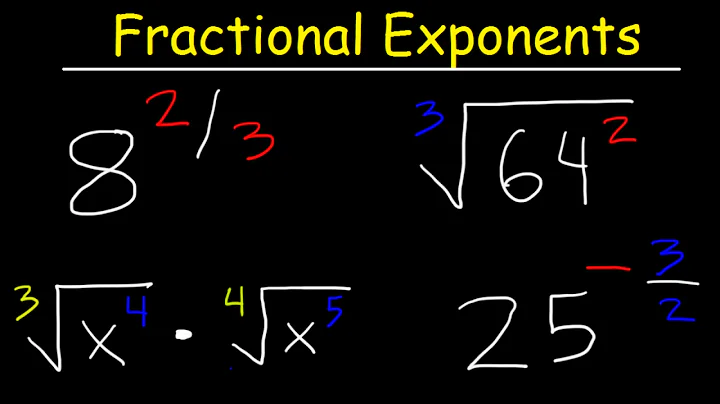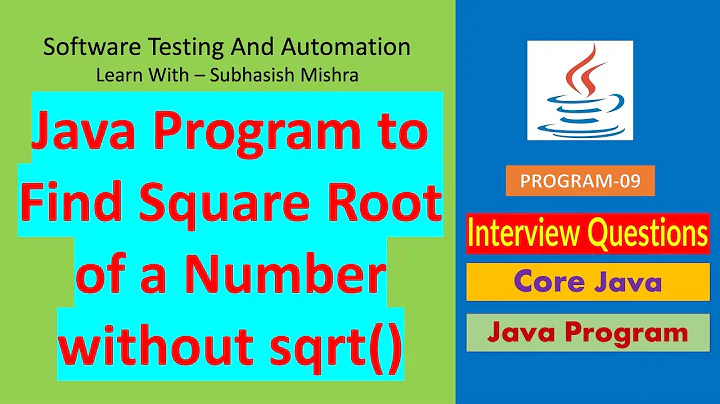Calculating nth root in Java using power method
Solution 1
Since it is not possible to have arbitrary-precision calculus with double, you have three choices:
- Define a precision for which you decide whether a
doublevalue is an integer or not. - Test whether the rounded value of the
doubleyou have is a correct result. - Do calculus on a
BigDecimalobject, which supports arbitrary-precision double values.
Option 1
private static boolean isNthRoot(int value, int n, double precision) {
double a = Math.pow(value, 1.0 / n);
return Math.abs(a - Math.round(a)) < precision; // if a and round(a) are "close enough" then we're good
}
The problem with this approach is how to define "close enough". This is a subjective question and it depends on your requirements.
Option 2
private static boolean isNthRoot(int value, int n) {
double a = Math.pow(value, 1.0 / n);
return Math.pow(Math.round(a), n) == value;
}
The advantage of this method is that there is no need to define a precision. However, we need to perform another pow operation so this will affect performance.
Option 3
There is no built-in method to calculate a double power of a BigDecimal. This question will give you insight on how to do it.
Solution 2
The Math.round function will round to the nearest long value that can be stored to a double. You could compare the 2 results to see if the number has an integer cubic root.
double dres = Math.pow(125, 1.0 / 3.0);
double ires = Math.round(dres);
double diff = Math.abs(dres - ires);
if (diff < Math.ulp(10.0)) {
// has cubic root
}
If that's inadequate you can try implementing this algorithm and stop early if the result doesn't seem to be an integer.
Solution 3
I'd go for implementing my own function to do this, possibly based on this method.
Solution 4
You can use some tricks come from mathematics field, to havemore accuracy. Like this one x^(1/n) = e^(lnx/n).
Check the implementation here: https://www.baeldung.com/java-nth-root
Solution 5
Here is the solution without using Java's Math.pow function. It will give you nearly nth root
public class NthRoot {
public static void main(String[] args) {
try (Scanner scanner = new Scanner(System.in)) {
int testcases = scanner.nextInt();
while (testcases-- > 0) {
int root = scanner.nextInt();
int number = scanner.nextInt();
double rootValue = compute(number, root) * 1000.0 / 1000.0;
System.out.println((int) rootValue);
}
} catch (Exception e) {
e.printStackTrace();
}
}
private static double compute(int number, int root) {
double xPre = Math.random() % 10;
double error = 0.0000001;
double delX = 2147483647;
double current = 0.0;
while (delX > error) {
current = ((root - 1.0) * xPre + (double) number / Math.pow(xPre, root - 1)) / (double) root;
delX = Math.abs(current - xPre);
xPre = current;
}
return current;
}
Related videos on Youtube
Sara Alaa Khodeir
Updated on November 19, 2021Comments
-
Sara Alaa Khodeir over 2 years
I was trying to get a cubic root in java using
Math.pow(n, 1.0/3)but because it divides doubles, it doesn't return the exact answer. For example, with 125, this gives 4.9999999999. Is there a work-around for this? I know there is a cubic root function but I'd like to fix this so I can calculate higher roots.I would not like to round because I want to know whether a number has an integer root by doing something like this:
Math.pow(n, 1.0 / 3) % ((int) Math.pow(n, 1.0 / 3)).-
 fps over 8 yearsUse BigDecimal class, which is decimal representation of real numbers with arbitrary precision.
fps over 8 yearsUse BigDecimal class, which is decimal representation of real numbers with arbitrary precision. -
 fps over 8 yearsOf course there's no method to calculate nth roots in the BigDecimal class. So you'd need to implement it yourself. I'd give the newton raphson method a chance. See here.
fps over 8 yearsOf course there's no method to calculate nth roots in the BigDecimal class. So you'd need to implement it yourself. I'd give the newton raphson method a chance. See here.
-
-
Sara Alaa Khodeir over 8 yearsI know that this is correct, but I couldn't do that because I need to make sure that the number is an integer root, I just edited the question to include this.
-
 Raman Shrivastava over 8 yearsthis is what is already mentioned in question. that he;s not getting exact result and dont want to round the result.
Raman Shrivastava over 8 yearsthis is what is already mentioned in question. that he;s not getting exact result and dont want to round the result. -
 Manos Nikolaidis over 8 years@RamanShrivastava I edited the answer according to the edited question
Manos Nikolaidis over 8 years@RamanShrivastava I edited the answer according to the edited question -
 Obicere over 8 yearsThis issue has more to do with the way precision is defined for the
Obicere over 8 yearsThis issue has more to do with the way precision is defined for thedouble, not so much the method being used. -
Sara Alaa Khodeir over 8 years@ManosNikolaidis Thank you!
-
 Gary Chen almost 4 yearsYou've posted two answers. Which one is more useful?
Gary Chen almost 4 yearsYou've posted two answers. Which one is more useful?












